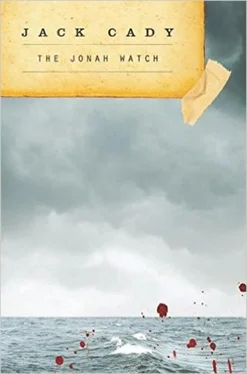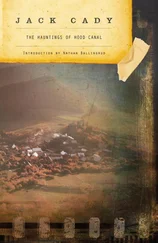“You’ll remember,” Brace said after a long pause, “how Lamp used to talk. He was always this and that, never before, never behind, just mostly between.” He brushed at a worn sleeve that carried its worn and tarnished insignia. The small Coast Guard shield was like a golden, unblinking eye.
“I knew him better,” said Howard.
“It is a zoo,” said Brace, “but we were wrong about Jonah. And Lamp, so was he. We only had one ghost.”
“I wonder if I understand.”
“Why should you?” said Brace. “You didn’t have one.” His face momentarily held a touch of young, potato-peeling wisdom, mast-painting wisdom.
“What didn’t I have?”
Brace’s face changed, the furrows deepening, and he seemed to own the wisdom of Reeser Lamp, or Levere. He looked into the darkening gray street where automobile headlights were now beginning to glow as if attempting to burn through the mist. “Our fathers,” Brace said. “No matter what shape it took, we have only ever had that one ghost. I thought and thought about this.”
And Howard, a son only of history, understood with a glad and rushing, sudden opening that there was at least one small history which contained no madness; as Snow had insisted, and which only he, Howard, could tell. Howard asked himself a question, and answered the question while he was asking. When God fails what does Jonah do? Howard finished his drink. He shook hands, made vague promise to meet. He drew on his coat, he backwardly waved, and left.
Small Ships—Hurry Up Jobs—Lousy Weather—Even the Oldtimers Get Green Around the Gills
—by Jack Cady, YN2
[This article was published in the US Coast Guard magazine in October, 1956.]
Asearchlight bounces off a rolling pitching trawler. The white coil of heaving line stretches into her rigging. Towing hawser hisses out. A course is set for Portland, Boston, New York, Norfolk. Another notch is cut into the wheel.
Nearly every Coast Guard vessel passes a line to someone in distress over the period of a year, the major portion of the lifesaving end of the service is borne by small vessels ranging from 64 to 165 feet, including the larger WAT class tug. The duty is good from the liberty standpoint most of the time. The duty underway can be, and usually is, a bitch. Suffice it to say that men coming aboard from weather duty are certain they won’t get sick. They nearly always do. Time and experience are only partial insurance. Men with 18 to 20 years’ service walk around giving phony belches on a bad day.
Still, the job is what counts and the little ones can do the job. How much of a job they do and how often they have to do it can best be given by the example of one of them. She is the CGC Yankton , 110 feet, based at Portland, Maine, where she is currently pulling Able or patrol status one week out of three. The running to be described occurred between April, 1953, and April, 1954, a year taken from 18 months I served aboard her.
The first few jobs were routine tows. Sometimes we were undermanned and ran, at least once, standing four on and two off. Towing watch, wheel watch, sack time and return. Very good, but very tiring experience. As summer came more men were assigned.
The first big one was in June when Able status paid off for 11 men on the sinking trawler Vandal . The call came over 2670 around 2200 and the Yankton was underway in less than 10 minutes. The sinking vessel was about seven miles off the Portland Lightship and the sea, for once, was slick. As the Yankton approached the trawler, it could be seen going fast. When the pumps went aboard she had less than a foot of freeboard. The submersible and handy billy gained on the water until she was safe to two alongside. Fifteen degrees right rudder kept the course.
We logged a run to Rockland with the Jeanne D’Arc in tow and a week or so later picked up Charles Holderness from the fishing vessel Thomas D . Holderness had made the near fatal mistake of leaning over a winch with a strain on it. When the cable parted, it slashed him from temple to temple and knocked out some front teeth. We had a corpsman from Base South Portland. The only space for him to work was the table in the mess deck. No one was hungry that day.
═
Ever go boarding? The entire crew is in undress blues and only line handlers are at the rail. There are usually women in the yachts and some of them don’t really seem to care about much. One we will always remember fondly was wearing a yellow blouse open in front, and with nothing on underneath. Disheartening in a sense, because what can you do?
Late summer and we caught a job on Charlie 12. No one ever catches one on Charlie. That’s the status you take the wife and kids driving, go to church, get drunk; depending on your inclinations. Still we got one and went out with two seamen, three enginemen and the captain. The seamen laid out the tow, stood the wheel watches out, passed the line, and retrieved it when we came in. We had a tough captain but he took the wheel all the way back with the tow. We wondered if perhaps we had him pegged wrong after all. Later developments proved that we had.
The scalloper Black Diamond went high and dry on Clapboard Island Ledge and we shored and towed for two high tides before she was refloated. The inadvisability of running a six-foot draft through three feet of water was pointed out to the crew.
Ever drag a body? No one really wants to find it.
September, and the first real heller of the year whooshed out of the NE. A tug lost her tow of another tug off Alden’s Rock on the Maine coast. The rock is the size of a hotel and is coiled off Portland Head and down the coast ready to kill anything that touches it.
The dead tug with the two men aboard was drifting down on the rock as we overhauled her. The line was passed three times into the teeth of a 40-to-50-knot wind. First the messenger parted. The next time the line was aboard and the men on the tug were unable to secure it because of the weight. We recovered the line and with a touchy bit of seamanship, the Yankton was put alongside the tug in the heavy swell. The line was virtually handed aboard. The tug was snatched off just in time.
We towed the Mary Rose to Southwest Harbor, water breaking against the bridge ports. Two miles good in four hours.
═
Fire! More fire than the Portland fireboat and fire department could handle. Yankton returned from a run to Rockland to fight it. The Acushnet pumped hundreds of thousands of gallons. The Cowslip fought the fire alongside the cg-5004-d from Base South Portland. For two days the blaze continued at the Pocahontas coal wharf, Portland, in freezing January weather. Ice formed on the wharf and on the ships. Ice formed on the men’s jackets. After it was whipped everyone settled back and congratulated each other. They had the right.
The Yankton wound up the year breaking ice in the Penobscot River, guiding coastwise tankers to berth and keeping river traffic moving. Her propeller was bent by the ice and until yard time in the spring she swam like a ruptured duck.
So it was a good busy year. Counting the three men we brought in after a two-day search in dense fog, we had saved 15 lives for sure and had some probables. We had towed more than 20 vessels. We had worked the coast, and off shore, from Southwest Harbor, Maine, to New Bedford, Maine. The Yankton was a tough one to cut sometimes, but she was a tougher one to beat. They never sent her on a job that she didn’t do. At least I don’t know of one.
Читать дальше












